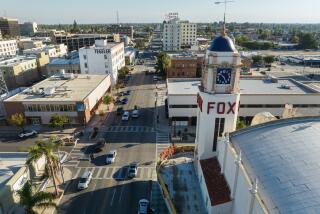Strike Halts Burials at 19 Cemeteries in the Bay Area
Robert McQueen thought his family’s suffering had ended last week when his 81-year old father died after a long and painful illness.
But after McQueen made arrangements for a funeral service last Wednesday, local cemetery workers called a strike that has halted burials at 19 Bay Area cemeteries, including the one where McQueen’s father was to be interred.
“This is a rude thing for a family to go through,” said McQueen, a Danville businessman. “It’s hard enough to go through the dying process, but this is really upsetting. Dad’s in a sealed casket above ground, and there is nothing for us to do but wait until the whole thing is over.”
McQueen’s problems are typical of those experienced by families affected by the strike, which began last Thursday when negotiations for a new contract, which had been going on since January, reached a stalemate.
It is the fourth cemetery workers’ strike in 14 years in the Bay Area.
Representatives of Local 265 of the Cemetery Workers and Green Attendants Union, representing about 180 workers, had been asking for a 5% to 10% pay raise over their current wages of $100 a day. Their contract expired March 1.
Two cemetery management groups--Associated Cemeteries in the West Bay and the East Bay Interment Properties Assn.--offered a 3% raise, according to John Cantwell, representing the 19 cemeteries.
Meanwhile, with no immediate resumption of the talks scheduled, bodies began piling up at Bay Area mortuaries, which depend almost entirely on the struck cemeteries to arrange burial services.
“We can’t bury anyone, so we just sit and wait,” said Arthur Sullivan, director of Arthur J. Sullivan and Co. funeral home in San Francisco.
Sullivan said that funeral services were proceeding as scheduled except that bodies were being kept at the mortuary’s vacant rooms in sealed caskets until the strike is over. Sullivan had five caskets awaiting burial by Monday afternoon.
“It could get a little tough to store some bodies, but you can put a lot of caskets in a room,” Sullivan said.
Sullivan speaks from the experience of the 1971 cemetery workers’ strike, the longest of the four recent walkouts. It lasted four months. By the time it had ended, more than 1,800 bodies were awaiting burial.
“It’s not really a problem for us, but it’s a tragic situation for the families involved,” said Arch Monson, director of Halsted-N. Gray and Co., one of San Francisco’s largest funeral homes. Monson said he had stored 12 bodies in sealed caskets in a warehouse normally used to store empty coffins.
Local health officials said no immediate health problems are posed by above-ground storage of bodies as long as they are properly embalmed and the caskets are sealed.
City health inspector Bill Nall said that during the 1971 strike, health officials inspected some of the storage areas of local mortuaries. For the moment, no inspections are planned in this strike.
Colma Burial Ground
Except for the military cemetery at the Presidio, there are no burial grounds in San Francisco. A ban on cemeteries by city officials 40 years ago led to the development of Colma, a small town 15 miles south of San Francisco that has only 731 living citizens but more than one million dead buried in its several cemeteries.
Most of the cemeteries being struck are in Colma, and the walkout has had a ripple effect on the town’s other businesses, such as flower shops, which are dependent on the cemetery industry.
“San Francisco is a good union town, and I’ve had a lot of customers say they won’t cross the pickets as long as the strike is on,” said one florist who asked not to be identified.
More to Read
Start your day right
Sign up for Essential California for news, features and recommendations from the L.A. Times and beyond in your inbox six days a week.
You may occasionally receive promotional content from the Los Angeles Times.






